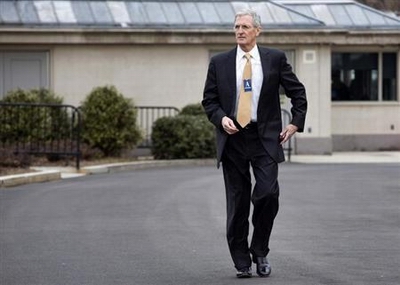
Minneapolis-based Cargill, one of the world's largest privately held corporations and a top commodities trader, reported $483 million in earnings for the fourth quarter ended May 31, up from $73 million a year earlier when the company was hurt by volatile commodity markets and reported its worst quarter in more than 20 years.
For the full year, Cargill, the largest grain exporter from the United States - the world's top grain export nation - earned $2.31 billion compared to $1.17 billion a year ago, when the company was squeezed by soft economies and volatile markets.
Quarterly revenues rose 4 percent to $35.4 billion while full-year revenues totaled $136.7 billion, up 2 percent from last year's $133.9 billion. If Cargill was a publicly held company, those revenues would place it at No. 10 on the Fortune 500 list, between Valero Energy and Ford Motor Co.
"Cargill's earnings improved significantly over the prior year," said Greg Page, Cargill chairman and chief executive officer. "Nearly all of our business units were profitable, and more than two-thirds exceeded year-ago results."
While most of Cargill's units were profitable, earnings at its animal protein business were down from last year, largely hurt by high feed costs and the tightest U.S. cattle supply in 60 years. Energy businesses, including trading, also declined.
Standard & Poor's ratings analyst Chris Johnson told Reuters that Cargill's performance marked a significant rebound from a year ago and is reviewing whether Cargill will be in line for a debt rating upgrade to stable from its current negative outlook.
"At the end of the day they are largely meeting our expectations," said Johnson, noting he had been waiting for Cargill's beef segment to show signs of improvement, which it did in the fourth quarter.
Breadth Pays Dividends
Cargill's commodity trading rivals Archer Daniels Midland (ADM.N) and Bunge (BG.N) in the last two weeks have reported disappointing earnings for the quarter ended June 30, tied to short supplies of corn and soybeans due to the historic U.S. drought last summer. Crops have recovered this year and a bumper harvest is expected to start in September.
Among Cargill's five major business areas, the origination and processing segment was the largest contributor to earnings in both the fourth quarter and full year, the company said in a statement.
"The segment drew on Cargill's global footprint and strengths in market analysis, logistics and risk management to overcome the supply challenges caused by weather disruptions and tight stocks, serving customers reliably. The segment also realized turnarounds in cotton and sugar from the prior year," it said.
Earnings in the risk management and financial segment rose considerably from the year before.
Cargill's big food ingredients business, which supplies hundreds of products to food and beverage makers, also saw improved results after last year's record earnings, the company said. "Performance was particularly strong in sweeteners, starches and cocoa in several countries," it said.
Cargill's size and scope continued to expand in the 65 countries where it operates and employs 140,000 people.
The company said it currently has $2.6 billion of major agricultural, food and energy projects under construction or recently opened in 14 countries around the world.
These include a poultry facilities in Efremov, Russia, as well as in China's Anhui province and in Korat, Thailand; an animal nutrition facility in South Korea; a corn processing plant in the southern Brazilian state of Paraná; a cocoa processing plant in Indonesia's East Java province; and, a U.S. biorefinery campus in Fort Dodge, Iowa.





